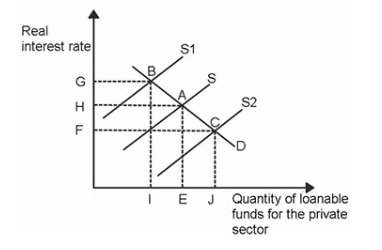Question
Review each question and be CERTAIN of the answer. do NOT write on paper. 1, Use the graph to answer the question that follows. Which
Review each question and be CERTAIN of the answer. do NOT write on paper.
1, Use the graph to answer the question that follows. Which of the following policy actions would lead to the shift shown in the graph?
| Increasing taxes; open market selling of bonds | |
| Decreasing taxes; open market purchasing of bonds | |
| Decreasing taxes; lowering reserve requirement rate | |
| Increasing government spending; open market purchasing of bonds |
2. Long-run self-correction of the economy generally shifts ________ , while fiscal and monetary policy solutions focus on shifting ________.
| supply; demand | |
| demand; supply | |
| aggregate demand; aggregate supply | |
| aggregate supply; aggregate demand | |
| real interest rates; nominal interest rates |
3. If an economy is in long-run equilibrium, then which of the following is true for the economy's Phillips curve model?
| The short-run Phillips curve intersects the long-run Phillips curve, and the actual unemployment is equal to the natural rate. | |
| The short-run Phillips curve does not intersect the long-run Phillips curve, and the actual unemployment is equal to the natural rate. | |
| The short-run Phillips curve intersects the long-run Phillips curve, and the actual unemployment is more than the natural rate. | |
| The short-run Phillips curve does not intersect the long-run Phillips curve, and the actual unemployment is less than the natural rate. | |
| The short-run Phillips curve intersects the long-run Phillips curve, and the actual unemployment is less than the natural rate. |
4. The Federal Reserve increases the money supply by 3% over a long period while the United States runs at full employment. In the long run, what does the quantity theory of money say will happen?
| The natural rate of unemployment will decrease by 3%. | |
| The price level will decrease by 3%. | |
| Unemployment will increase by 3%. | |
| Nominal output will increase by 3%. | |
| Real output will increase by 3%. |
5. If the money supply in an economy is increased by 6% with no impact on real output in the long run, then
| the economy is operating at its full-employment level | |
| the economy is facing recessionary pressures | |
| the economy experienced a 2% decrease in prices | |
| the economy has increased cyclical unemployment | |
| the economy's nominal GDP will remain constant |
6. If in a financial year, a government's expenditure on goods and services amounts to $200 billion, the amount it spent on social security benefits equals $150 billion, and the revenue it collected from taxes is equal to 300 billion, then which of the following statements is true?
| The government is running a budget surplus. | |
| The national debt will remain unaffected. | |
| The government will have to borrow money to finance its deficit. | |
| The government's revenue equals its expenditure. | |
| The government will not have to pay interest on borrowed funds. |
7. The economy depicted in this data table is closed, with no international trade of any kind
| Government spending | $50 billion |
| Government transfer payments | $30 billion |
| Tax revenues | $40 billion |
| Capital investments | $10 billion |
Based on the data, which of the following statements must be true?
| The government doesn't have to borrow in the loanable funds market, as it is running a balanced budget. | |
| The government doesn't have to borrow in the loanable funds market, as it is operating with a budget surplus. | |
| The government has to borrow in the loanable funds market to finance its budget deficit. | |
| The government has to borrow in the loanable funds market to increase its future revenue. | |
| The government expenditure is equal to the amount of revenue collected from taxation. |

Step by Step Solution
There are 3 Steps involved in it
Step: 1

Get Instant Access to Expert-Tailored Solutions
See step-by-step solutions with expert insights and AI powered tools for academic success
Step: 2

Step: 3

Ace Your Homework with AI
Get the answers you need in no time with our AI-driven, step-by-step assistance
Get Started


